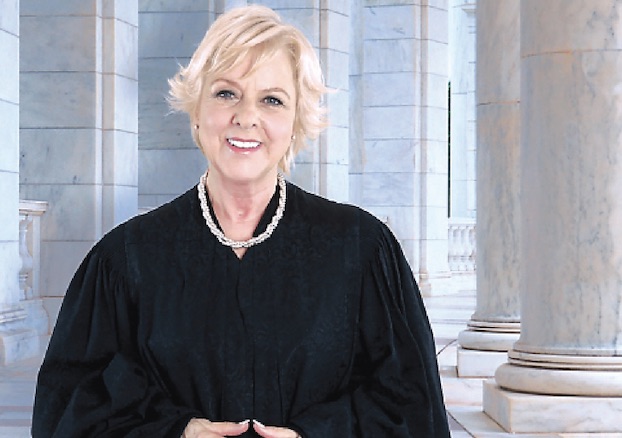Woodard among most in-demand arbitrators in New York
Published 4:36 am Wednesday, March 2, 2022

- A Lake Charles resident for 27 years, Billie Colombaro Woodard was a Louisiana Third Circuit Court of Appeal Judge here. (Special to the American Press)
If all the world’s a stage, Billie Colombaro Woodard is no mere player. When she decides to do something, she does it.
“I’m not going to save it for a bucket list,” she said.
Her priority is her work in the law. A Lake Charles resident for 27 years, Billie Colombaro Woodard was a Louisiana Third Circuit Court of Appeal Judge here. American Press readers might remember her as the face of KPLC-TV’s legal segment, “You and the Law.”
She’s been in Off-Broadway productions, co-wrote a musical and has written two sitcoms, soon to be pitched to streaming services. At Harvard Law School, she teaches a course section titled, “Power and Presence.” She says learning a few tips can help anyone be more persuasive and set the stage for success.
“When I leave this life, I don’t want to have any juice left,” she said.
Recently she was recognized as being among the most in-demand arbitrators in the state of New York, according to a news release from the National Academy of Distinguished Neutrals.
The main difference between arbitration and litigation law, Colombaro explains, is that the court is involved in the case of litigation. In arbitration, parties settle outside of court. The decision agreed upon in arbitration is binding with no chance of appeal. A mediator acts as a facilitator between parties in a dispute and tries to broker a deal. Unlike an arbitrator, a mediator has no authority to rule on anything.
“You don’t have to be a judge to be an arbitrator,” she said. “If the parties agree, even someone who is not an attorney can be an arbitrator.”
In a phone interview with the American Press, she recalled the day she pitched the “You and the Law” show to the station’s general manager. “You’ve got a need out there I can fill,” she told him. “In the minute you give your anchors to pass the time with chit chat, I can inform the public on legal issues that affect them on a day-to-day basis. All I need is one camera person. I’ll condense the law and possible solutions and it will be a human interest story. I’ll do my own editing.”
She had never edited a video.
“I knew I could learn it,” she said. “If someone else can do it, I can do it.”
Never being one to take no for an answer, she persuaded the station manager to give her three months. The segment was popular for 15 years. Taylor Trade published her book, “You and the Law.”
Naysayers proposed the reasons she should not go to law school at age 31 and make a weekly commute between Lake Charles and New Orleans. She had been out of school for some time. Most Lake Charles attorneys were men.
But she made up her mind and did it.
Until she practiced law, nothing felt right, she said, not her role as an international corporate banker, Bloomingdale’s buyer, airline employee or hospital administrator, (a study program she did not complete because classes were not offered here). She remembers her father telling her when she was only 10 years old that she would make a good lawyer.
“He never explained what he meant by that,” she said. “Later it occurred to me that he was talking about my sense of fairness, which he instilled in all of us. ‘Life isn’t fair, but you can be,’ was one of his favorite sayings. I do remember that whenever two people were in a dispute and I sensed an imbalance of power — for good or for bad or worse — I always jumped in to make it a fair fight.”
She credits her blue collar parents’ work ethic and upbringing for her success.
Her “Power of Presence” course is designed to help trial lawyers enhance their ability to win the case by recognizing and dealing with fear and lack of confidence, how to capture and maintain attention, project confidence, develop presentation skills and develop the right language and body language.
“The ability to persuade has a far-reaching impact,” she said. “Anybody can learn to do it.”
She said body language, tone of voice, rate of speech and word choice are more important than some people realize.
“One study shows that a person’s reaction is based on only seven percent of what the speaker says, 38 percent is based on how the speaker says it and 55 percent is based on body language.”
One thing women in particular can do to be more persuasive, according to Colombaro, is eradicate words that diminish you or your message or ask for permission to speak. Here are some examples:
• Sorry
• Just…
• I would say that…
• I think…
• I won’t take too much of your time…
• Little
• I guess…
• I don’t know
• Let me ask you a question.
• May I ask you a question
• I will try
“These not only diminish the importance of what you’re about to say, they signal a lack of confidence and worth in your message and in yourself,” Woodard said. “The ability to persuade is important for everyone to learn in order to achieve much of everything in our lives — big and small.
“Persuasion begins with your thoughts and beliefs, which are telegraphed through your body language, your choice of words, your tone, intonation and pacing when speaking. In other words, your thoughts and beliefs affect the way you feel, thus the way you act, thus the way others perceive you and finally, the way others treat you and respond to your ideas and requests.”





